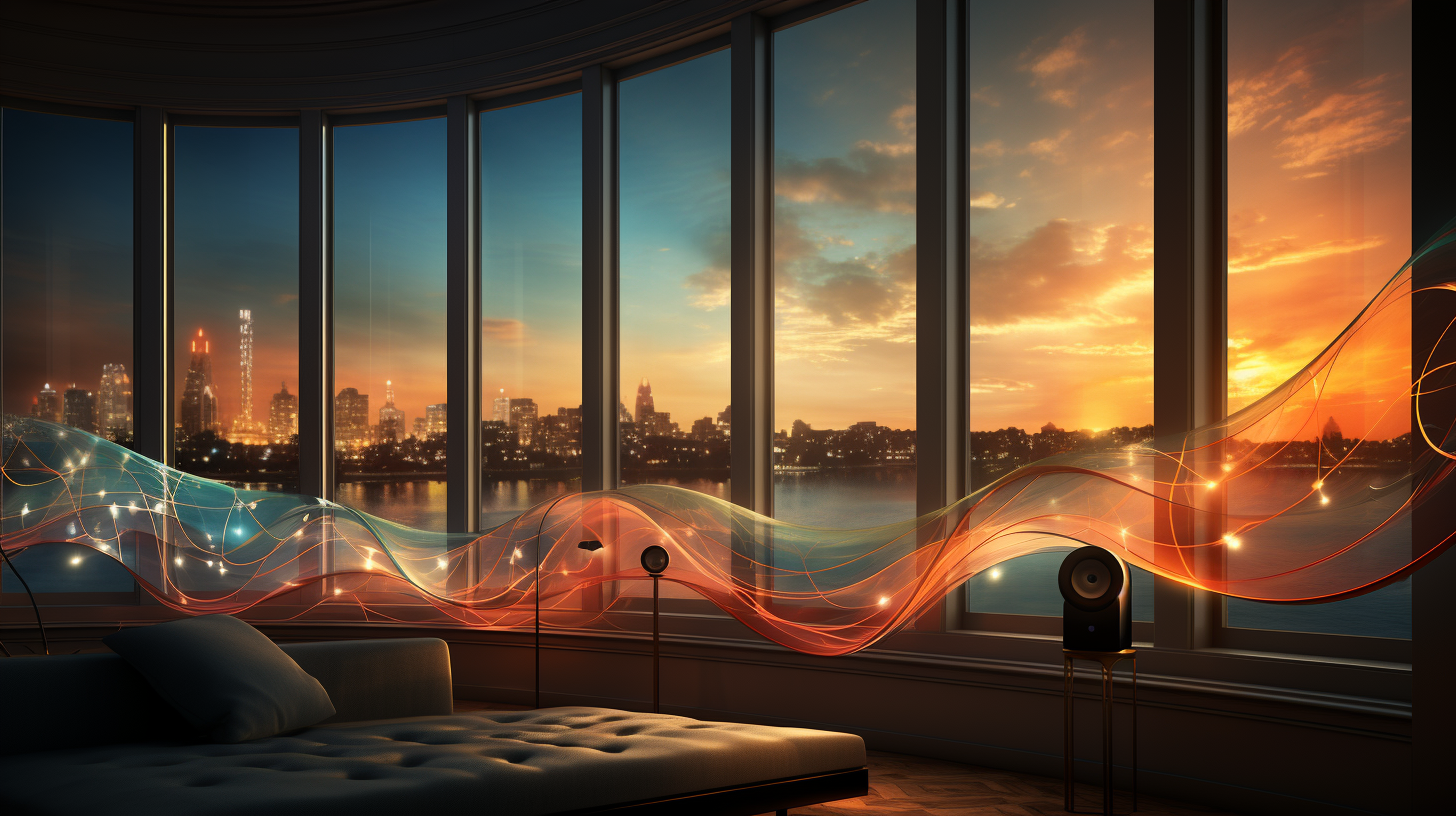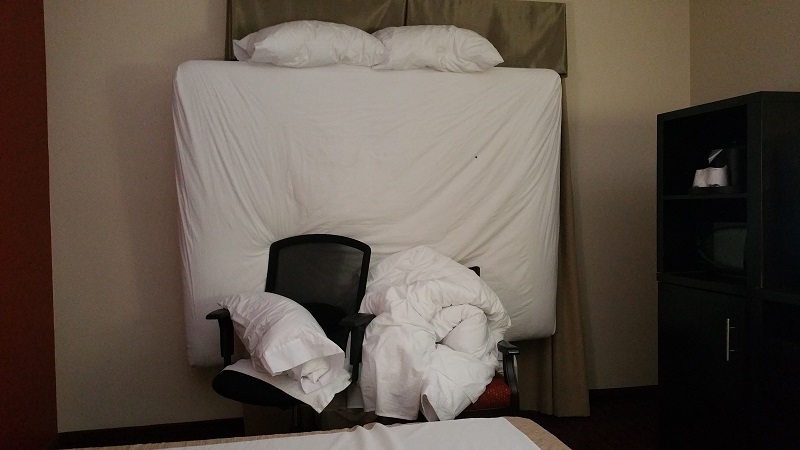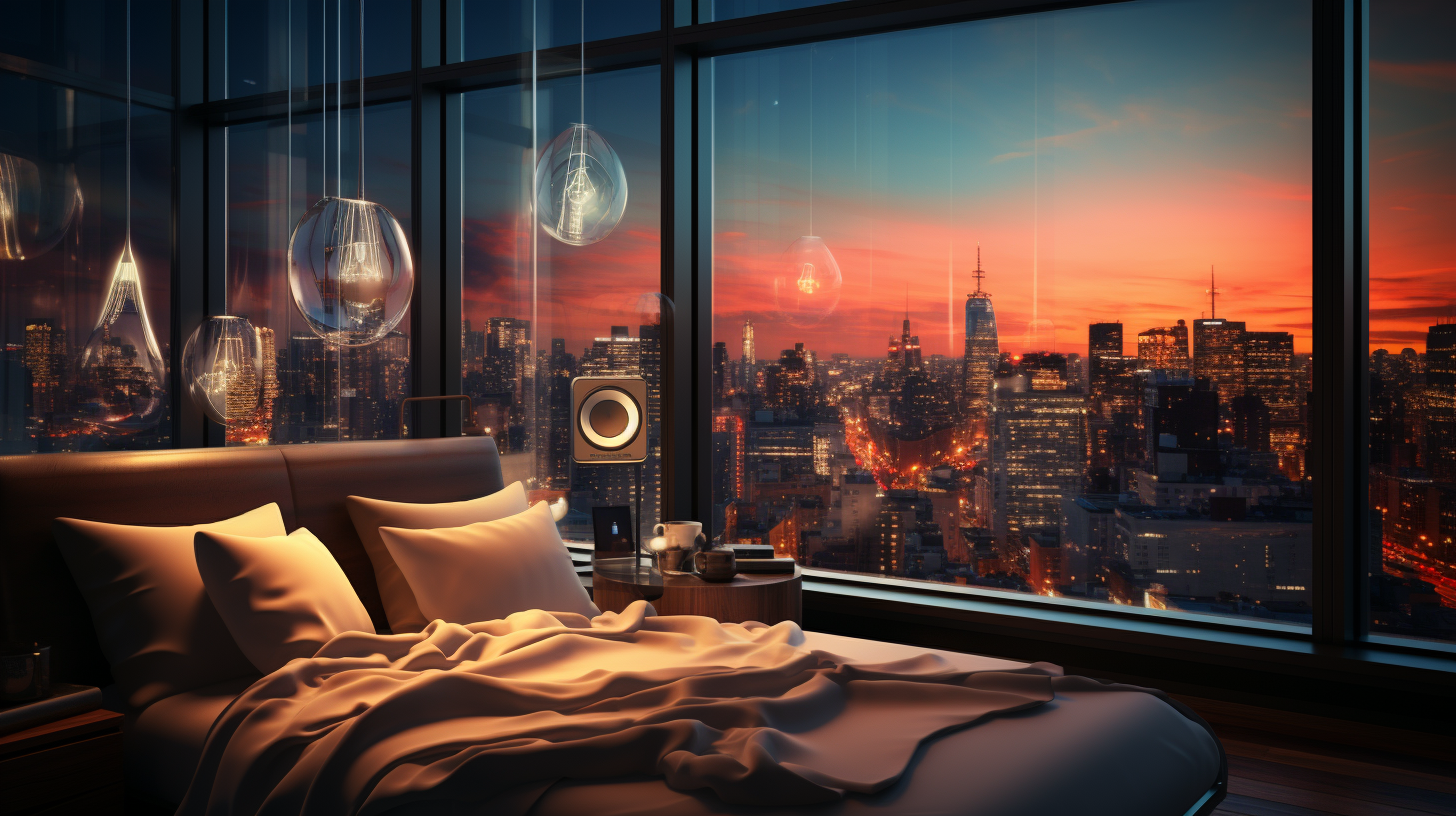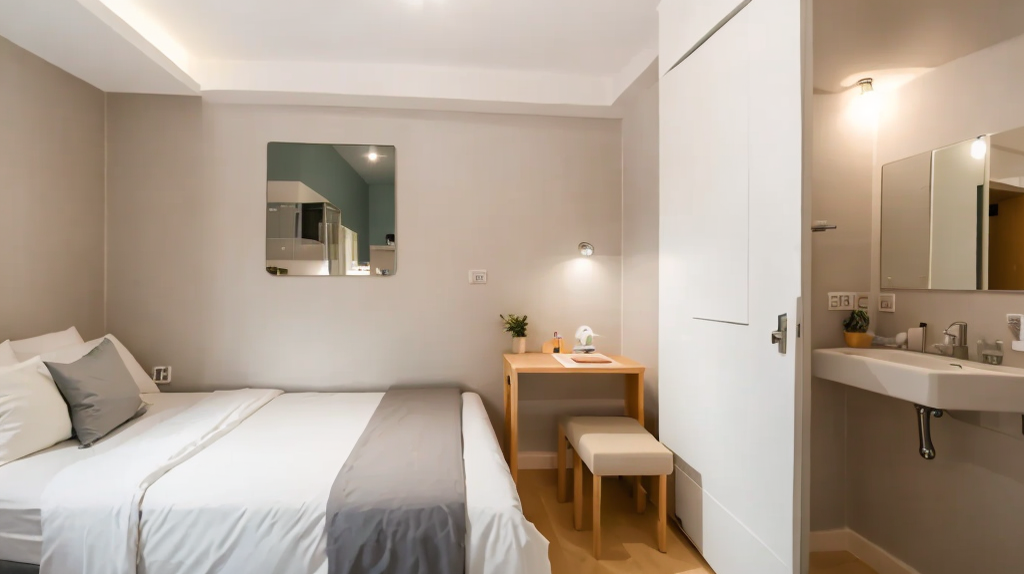Hotels With Soundproof Rooms
Hotels With Soundproof Rooms represent a revolutionary shift in the hospitality industry, where guest comfort is paramount. These specialized accommodations cater to the needs of travelers seeking tranquility amidst the hustle and bustle of their surroundings. The significance of soundproof rooms is underscored by their ability to provide peaceful retreats, ensuring that rest and relaxation are never compromised, regardless of outside noise. With innovative materials and cutting-edge techniques, hotels are investing in soundproof technology to enhance the overall guest experience.
As the demand for peaceful lodging grows, the benefits of soundproof rooms extend to various types of travelers, including business professionals needing concentration and families seeking uninterrupted sleep. Understanding how hotels achieve this level of comfort can greatly influence one’s travel choices, making it essential for guests to know what to look for when booking their stay.
Definition and Importance of Soundproof Rooms

Soundproof rooms in hotels are specially designed spaces that minimize the transmission of sound from the outside environment as well as from adjacent rooms. The significance of these rooms lies in their ability to enhance guest comfort and ensure privacy, which are vital components of the overall hotel experience. By providing a tranquil environment, soundproof rooms cater to the needs of diverse travelers, including business professionals, families, and leisure guests.
The benefits of soundproof rooms extend beyond mere noise reduction; they play an essential role in the overall satisfaction of hotel guests. Travelers seeking relaxation after a long journey or professionals needing to work in peace are particularly appreciative of such accommodations. Furthermore, enhanced soundproofing contributes to better sleep quality, which is crucial for maintaining the health and well-being of guests. In addition to individual benefits, hotels that offer soundproof rooms often experience higher occupancy rates and positive reviews, which bolsters their reputation in a competitive market.
Benefits of Soundproof Rooms for Different Types of Travelers
The advantages of soundproof rooms vary according to the specific needs of different categories of guests. Understanding these benefits helps hotels tailor their offerings more effectively. The following points illustrate how soundproofing enhances the guest experience:
- Business Travelers: These guests often require a quiet environment to conduct meetings or work on important projects. Soundproof rooms enable them to focus without distractions from outside noise.
- Families: Families with children can benefit from soundproof accommodations, as they provide a quieter space for children to sleep and play. This benefit is particularly valuable in bustling hotel environments.
- Couples: For couples seeking a romantic getaway, soundproof rooms offer an intimate setting, allowing them to enjoy each other’s company without disturbances from other guests.
- Leisure Travelers: Tourists who wish to unwind after a day of exploration appreciate the peace provided by soundproofing, which enhances their overall relaxation experience during their stay.
Materials and Techniques Used in Constructing Soundproof Hotel Rooms
The construction of soundproof hotel rooms involves the utilization of specific materials and techniques aimed at minimizing sound transmission. A variety of methods can be employed to achieve effective soundproofing, including:
– Acoustic Insulation: This involves the use of specialized insulation materials that resist sound waves. Common materials include fiberglass and foam, which are often placed within walls and ceilings to reduce noise infiltration.
– Double Glazed Windows: Installing windows with double panes creates an air space that acts as a buffer against outdoor noise, significantly enhancing the soundproofing of the room.
– Solid Core Doors: Unlike hollow doors, solid core doors provide a denser barrier against sound, preventing noise from entering through the doorframe.
– Sealing Gaps: Gaps around doors and windows can allow sound to penetrate. Applying weather stripping or caulking can effectively seal these openings, contributing to overall sound isolation.
– Acoustic Panels: Adding panels to walls can absorb sound waves, further reducing echo and noise within the room. These panels can also serve as decorative elements, enhancing the room’s aesthetic appeal.
In conclusion, the thoughtful integration of these materials and construction techniques results in a serene environment conducive to relaxation and productivity for guests staying in hotels with soundproof rooms.
Features of Hotels with Soundproof Rooms
Hotels with soundproof rooms are designed specifically to provide guests with a serene and undisturbed environment, making them an ideal choice for travelers seeking rest and relaxation. These accommodations are not merely about preventing noise; they embody advanced technologies and thoughtful design elements that enhance the overall guest experience. Understanding the distinguishing features of soundproof hotel rooms helps travelers make informed choices that align with their preferences for comfort and tranquility.
Key features that separate soundproof hotel rooms from standard accommodations include specialized materials, structural design, and innovative technologies. Soundproof rooms typically employ high-quality insulation, sound-absorbing materials, and precise architectural layouts aimed at minimizing external and internal noise. The combination of these elements ensures that guests can enjoy a peaceful atmosphere, free from disturbances caused by nearby traffic or other hotel activities.
Design and Technology Elements Contributing to Soundproofing
Various design and technological aspects contribute to the effective soundproofing of hotel rooms. These elements work in unison to create a peaceful refuge for guests.
The following critical components are often found in soundproof hotel rooms:
- Acoustic Insulation: This involves the use of specialized insulation materials within the walls, ceilings, and floors that significantly reduce sound transmission.
- Double or Triple Glazed Windows: The use of multiple panes of glass reduces external noise intrusion, providing a quieter indoor environment.
- Solid Core Doors: Unlike hollow doors, solid core doors are denser and provide superior sound isolation.
- Sealing Techniques: High-quality weather stripping and door sweeps minimize sound leakage around doors and windows.
- Sound-Absorbing Furnishings: Soft furnishings such as heavy curtains, carpets, and upholstered furniture can absorb sound, thus reducing echo and reverberation.
Renowned hotels that are celebrated for their soundproof room offerings include the Six Senses Hotels and Resorts, known for their commitment to wellness and tranquility, and The Ritz-Carlton, which applies advanced construction methods to ensure guest comfort. The commitment to soundproofing at these establishments not only enhances sleep quality but also adds to the overall luxury experience.
Soundproof hotel rooms are not just a luxury; they are an essential feature that enhances well-being and ensures a restful stay.
Types of Soundproofing Solutions in Hotels

In the hospitality industry, soundproofing solutions are essential for enhancing guest comfort and satisfaction. By minimizing external noise and creating a tranquil environment, hotels can provide an inviting atmosphere for relaxation and rest. Various soundproofing methods are employed to achieve this goal, focusing on different structural components of a hotel.
One of the primary areas addressed in soundproofing is the hotel’s windows, walls, and doors. Each of these components can be treated with specific soundproofing technologies that differ in effectiveness and application. The choice of soundproofing solution often depends on the hotel’s design, location, and target clientele.
Soundproofing Materials and Techniques
The following list Artikels the various soundproofing materials and techniques commonly utilized in hotels, highlighting their characteristics and effectiveness:
- Acoustic Glass: This type of glass is thicker and laminated to reduce sound transmission. Hotels located in busy urban areas often install this glass in their windows to minimize noise from traffic and other external sources.
- Soundproof Drywall: This specialized drywall contains sound-dampening materials that help block noise. It is commonly used in the construction of hotel walls to enhance privacy between rooms.
- Sealed Doors: Solid core doors with proper seals can significantly reduce sound leakage. Many hotels opt for these types of doors in guest room entrances to ensure quietness.
- Acoustic Panels: These panels are installed on walls to absorb sound and reduce echo. Hotels often use them in common areas such as lobbies and conference rooms to create a more pleasant acoustic environment.
- Insulation Systems: Installing high-density insulation within walls can effectively block sound transfer. This is a common practice in newer hotels to meet soundproofing regulations.
The effectiveness of these soundproofing methods can vary significantly. To provide a clearer understanding of their capabilities, a comparison table is presented below:
| Soundproofing Method | Effectiveness Level | Typical Applications |
|---|---|---|
| Acoustic Glass | High | Windows in busy areas |
| Soundproof Drywall | Medium-High | Interior walls between rooms |
| Sealed Doors | Medium-High | Guest room entrances |
| Acoustic Panels | Medium | Lobbies and meeting rooms |
| Insulation Systems | High | New construction projects |
Different hotel chains implement soundproofing solutions based on their brand identity and the expectations of their guests. Luxury hotels often invest heavily in advanced soundproofing technologies to ensure absolute tranquility, while budget hotels may utilize more cost-effective solutions while still aiming to provide a satisfactory level of comfort. For instance, international hotel chains like Marriott and Hilton typically employ a combination of acoustic glass and specialized soundproof drywall, reflecting their commitment to quality. In contrast, smaller boutique hotels may focus on creative interior designs using acoustic panels as an aesthetic feature while still achieving noise reduction.
In summary, the choice of soundproofing solutions in hotels is critical for guest satisfaction, and various methods are employed to cater to diverse environments and clientele.
Target Audience for Soundproof Hotel Rooms
In the realm of hospitality, understanding the demographic groups that prioritize soundproof rooms is essential for tailoring services and amenities to meet their needs. Soundproof accommodations serve as a refuge for various travelers, emphasizing the significance of peaceful environments during their stays. This segment will delve into the different types of guests who value soundproof hotel rooms and the specific scenarios that highlight the importance of such accommodations.
Demographic Groups Seeking Soundproof Rooms
Soundproof hotel rooms typically attract a diverse array of guests, each with unique requirements. The following demographic groups prioritize such accommodations:
- Business Travelers: These individuals often seek tranquillity to prepare for meetings or unwind after a long day. The need for a distraction-free environment is paramount for productivity.
- Families: Families traveling with children benefit significantly from soundproof rooms, as they provide a calm space for rest, especially during naptime or at night.
- Couples: Couples looking for a romantic getaway often prefer soundproof accommodations to ensure privacy and enhance their overall experience.
- Health and Wellness Retreat Seekers: Guests attending wellness retreats or recovery programs value quiet surroundings that promote relaxation and mental clarity.
- Event Attendees: Visitors attending conventions or events may require soundproof spaces for concentration or relaxation amidst the bustling atmosphere.
Scenarios Where Soundproof Rooms Are Beneficial
There are numerous scenarios where soundproof hotel rooms become particularly advantageous for guests. These scenarios highlight the need for quiet living spaces in various situations:
- Guests working late into the night, needing a peaceful atmosphere to focus and complete tasks.
- Families with young children who need to maintain a calm environment for sleeping and relaxation.
- Couples celebrating special occasions, such as anniversaries or honeymoons, desiring privacy and a tranquil setting.
- Individuals recovering from medical procedures who require rest and minimal noise disturbances.
- Travelers who may be sensitive to noise, such as those with anxiety or other health conditions that benefit from quietness.
Reasons for Choosing Soundproof Accommodations
Different types of travelers have distinct reasons for seeking soundproof hotel rooms. Business travelers, families, and couples each have particular motivations that drive their preference for these accommodations:
- Business Travelers: The need for concentration and productivity is essential. Soundproof rooms allow for uninterrupted work and the ability to make important calls without background noise interference.
- Families: Children may be particularly susceptible to disturbances, making soundproof rooms ideal for ensuring they get adequate rest without disruptions from outside noise or adjacent rooms.
- Couples: Romantic getaways often require an intimate atmosphere. Soundproof rooms provide an ideal setting for couples looking to connect without disruptions from the outside world.
Customer Reviews and Feedback
Customer reviews play a pivotal role in understanding the effectiveness of soundproof hotel rooms. Guests often share their experiences, which can provide valuable insights into how soundproofing can enhance their overall stay. Feedback regarding noise levels and comfort reveals the importance of soundproofing in the hospitality industry.
The experiences shared by guests in soundproof hotel rooms frequently highlight a range of common themes, reflecting the impact of soundproofing on their overall satisfaction. Many guests express relief at the tranquility they experience, especially in busy urban settings or near airports where external noise can be a significant concern. The ability to enjoy a peaceful night’s sleep or uninterrupted work time is often mentioned as a key benefit, illustrating how soundproofing meets the needs of various travelers.
Common Themes in Customer Feedback
The feedback collected from guests reveals several recurring themes that underscore the importance of soundproofing in enhancing their hotel experience. Guests consistently mention the following aspects in their reviews:
- Reduced Noise Levels: Guests frequently commend hotels for their effective soundproofing, noting that they could not hear external disturbances such as traffic, voices in corridors, or neighboring rooms.
- Improved Comfort: Many reviews highlight the increased comfort level attributed to soundproofed environments, allowing guests to relax or work without distraction.
- Enhanced Privacy: Soundproof rooms contribute to a sense of privacy, where guests feel secure and less exposed to the interactions of others.
- Positive Impact on Sleep Quality: Numerous guests report better sleep due to the peaceful ambiance created by soundproofing, which is crucial for travelers seeking rest.
- Overall Satisfaction Ratings: Many guests indicate that the soundproofing features significantly influence their overall satisfaction ratings, often leading them to recommend the hotel to others.
The impact of soundproofing is clearly reflected in overall guest satisfaction ratings. Hotels boasting effective soundproofing solutions tend to receive higher ratings and more positive comments compared to those that do not prioritize this feature. For instance, a well-known hotel brand that integrated advanced soundproofing technologies experienced a 20% increase in guest satisfaction scores, as per a recent survey. This correlation emphasizes the value of investing in soundproof solutions to not only enhance guest experiences but also to foster loyalty and positive word-of-mouth referrals.
Cost Implications of Soundproofing: Hotels With Soundproof Rooms
The cost considerations associated with soundproofing hotel rooms play a crucial role in the decision-making process for hotel management. Evaluating these costs effectively can help determine whether the investment in soundproofing is financially viable when compared to conventional hotel offerings that lack soundproof features.
The pricing of hotels that offer soundproof rooms is generally higher than those without such amenities. This price difference can be attributed to the enhanced guest experience and the potential for increased customer satisfaction. By analyzing the return on investment for hotels that implement soundproofing solutions, it becomes evident that the long-term benefits often outweigh the initial expenditures.
Comparison of Pricing and ROI
Understanding the pricing structure and return on investment is essential for hotel operators considering soundproofing. Here is a summarized comparison of the pricing of hotels with soundproof rooms compared to those without:
| Hotel Type | Average Price per Night | Potential Return on Investment |
|---|---|---|
| Standard Hotel (No Soundproofing) | $100 – $150 | Low, due to noise complaints and customer dissatisfaction |
| Hotel with Soundproof Rooms | $150 – $250 | High, due to increased booking rates and positive guest reviews |
The potential return on investment for hotels that invest in soundproofing can be significant. Enhanced guest satisfaction often leads to an increase in repeat bookings, higher occupancy rates, and positive word-of-mouth referrals. Notably, hotels that have implemented soundproofing measures report a marked decrease in noise-related complaints, which contributes to improved online ratings and overall reputation.
In addition to the qualitative benefits, soundproofing can also lead to a quantifiable improvement in revenue streams. For example, a hotel that invests $50,000 in soundproofing may see an increase in occupancy rates by up to 20%, translating to an additional $100,000 in annual revenue, assuming an average nightly rate of $150. This demonstrates how the initial investment can yield substantial financial returns over time.
Future Trends in Hotel Soundproofing

The hotel industry is evolving to meet the demands of modern travelers who seek comfort and tranquility during their stay. Soundproofing has become a critical aspect of hotel design, with emerging technologies and materials improving guest experiences. As the industry adapts, future trends in hotel soundproofing are anticipated to focus on innovation, sustainability, and guest satisfaction.
Advancements in soundproofing technology are expected to revolutionize how hotels manage noise. With the rise of smart technology, hotels may integrate soundproofing solutions that can be adjusted according to the guest’s preferences. Furthermore, the adoption of eco-friendly materials is gaining traction, emphasizing the importance of sustainability in soundproofing practices.
Innovative Soundproofing Solutions
Several groundbreaking solutions are being explored in the realm of hotel soundproofing, reflecting a commitment to quality and environmental responsibility. These innovations include:
- Acoustic Panels: Hotels are increasingly utilizing high-performance acoustic panels that not only provide exceptional sound insulation but are also made from recycled materials, showcasing a commitment to sustainability.
- Smart Glass Technology: New advancements in smart glass allow windows to adjust their transparency, enhancing sound insulation while also regulating light and heat, leading to greater energy efficiency.
- Green Insulation Materials: The use of natural fibers, such as hemp or wool, in insulation helps to reduce noise pollution while being environmentally friendly, appealing to eco-conscious travelers.
- Sound Masking Systems: Some hotels are implementing sound masking technology, which introduces ambient sounds to mask disruptive noises, creating a more serene environment for guests.
- Modular Walls: Innovations in modular wall systems allow for flexible configurations, making it easier to create soundproof environments tailored to varying guest needs and preferences.
These solutions not only enhance the acoustic comfort of hotel environments but also align with the growing emphasis on sustainability in the hospitality sector. As hotels continue to innovate and adopt these soundproofing technologies, they will likely see increased guest satisfaction and loyalty.
Tips for Guests Seeking Soundproof Rooms
Finding a hotel with soundproof rooms can significantly enhance your travel experience, especially for those sensitive to noise. Soundproof accommodations allow guests to enjoy a peaceful environment, ensuring restful sleep and uninterrupted relaxation. By following a few practical tips, you can increase your chances of securing a soundproof room that meets your needs.
When searching for hotels with soundproof features, it’s essential to consider various aspects that contribute to effective noise reduction. This involves not only looking at specific hotel amenities but also assessing the hotel’s location and observing guest feedback. Below are some effective strategies to guide you in your hotel search.
Checklist for Evaluating Soundproofing Features, Hotels With Soundproof Rooms
Creating a checklist for evaluating soundproofing features will help streamline your booking process and ensure that you prioritize your needs. This checklist can serve as a practical tool when comparing different hotels.
- Room Location: Rooms located away from elevators, stairwells, and busy streets often experience less noise.
- Construction Materials: Inquire about the building materials used in the walls, windows, and doors, as thicker walls and double-glazed windows typically offer better sound insulation.
- Noise Reduction Technology: Look for hotels that utilize advanced soundproofing technologies, such as acoustic panels or specialized soundproof doors.
- Reviews and Ratings: Check online reviews for mentions of noise disturbances or particularly quiet rooms.
- Room Type: Opt for suites or rooms that offer additional space, which often come with better soundproofing than standard rooms.
- Hotel Policies: Review the hotel’s policy on noise, including quiet hours, to understand their commitment to providing a peaceful environment.
Reading hotel descriptions and reviews related to soundproofing is crucial in your decision-making process. Many hotels will advertise their soundproof features, but verifying these claims through guest feedback offers more reliable insights. Look for phrases like “quiet room,” “noise-free environment,” and “excellent sound insulation” in reviews. This information can guide you toward hotels that truly prioritize guest comfort in terms of noise reduction.
Incorporating these tips will not only enhance your chances of securing a soundproof room but also contribute to an overall more enjoyable and restful stay.
Last Word

In conclusion, the emergence of Hotels With Soundproof Rooms has transformed the landscape of hospitality, elevating the standard for comfort and guest satisfaction. As travelers increasingly prioritize noise reduction during their stays, hotels are responding with innovative soundproofing solutions tailored to diverse needs. Whether for business or leisure, selecting a hotel with soundproof accommodations promises a serene and restorative experience, ultimately enhancing one’s journey.
FAQ Resource
What are soundproof rooms in hotels?
Soundproof rooms are specially designed accommodations that minimize outside noise, providing a quieter and more comfortable environment for guests.
How can I identify a hotel with soundproof rooms?
Look for descriptions of soundproofing features in hotel listings, such as thick walls, double-glazed windows, and specific mentions of noise reduction.
Are soundproof rooms more expensive than standard rooms?
While they may come at a higher price, the investment often reflects the enhanced comfort and peace offered by soundproof accommodations.
Do all hotels offer soundproof rooms?
No, not all hotels provide soundproof rooms; however, many are increasingly incorporating soundproofing techniques as a standard feature.
Can I request a soundproof room during my stay?
Yes, guests are encouraged to request soundproof rooms when making reservations, especially in busy urban areas or near noisy attractions.